Nouvelles
15.11.2022
EMILE : un défi enrichissant
Date de l'événement : 27-28 octobre 2022
Format : atelier de formation, webinaire
https://edu.ro/organizatii-internationale
https://ccdar.ro/forum/viewtopic.php?f=6&t=871
Organisation locale : Rodica Diana Cherciu, ministère de l'Éducation avec le soutien du Centre de formation des enseignants – Arad
Experts du CELV : Letizia Cinganotto (Italie) and Kevin Schuck (Pays-Bas)
Participants : 27 enseignant·e·s :
- Professeurs de langues étrangères enseignant dans des classes bilingues/enseignement intensif – niveau secondaire
- Professeurs enseignant des matières non linguistiques dans des classes bilingues/enseignement intensif – niveau secondaire
- Formatrices et formateurs d'enseignant·e·s
- Inspectrices et inspecteurs de langues étrangères (qui approuvent les études facultatives en langues étrangères)
Le webinaire « EMILE et au-delà : plurilittératies pour un apprentissage plus approfondi » a offert une expérience professionnelle innovante dans le domaine des langues vivantes en tant que véhicule permettant de mettre en évidence et d'encourager la littératie des élèves dans divers domaines non linguistiques. Au-delà des perspectives théoriques, l'EMILE est sans doute l'un des exercices les plus délicats, car il stimule à la fois la créativité didactique, les réflexions originales et la pensée critique, tout en mettant au défi la maîtrise des enseignants à transformer la langue en un outil d'approfondissement, de connexion et de transfert des connaissances.
L’offre du CELV aux enseignant·e·s de langues étrangères, notamment en termes d'ateliers de formation, de publications, de boîtes à outils et de webinaires, représente une contribution dans le processus de capitalisation du potentiel des langues vivantes, dans le contexte de la demande croissante d'une éducation adaptée aux défis d'une société en constante évolution.
Rodica Diana Cherciu
Inspectrice
Ministerul Educației
România
Travaux et ressources du CELV dans ce domaine :
Version en roumain
CLIL – O Provocare care răsplătește
Atelierul CLIL and beyond: pluriliteracies for deeper learning a oferit o experiență profesională novatoare în domeniul studiului limbilor moderne, vizualizate ca instrumente de stimulare și facilitare a alfabetizării elevilor în diferite alte domenii științifice. Dincolo de perspectivele teoretice, CLIL reprezintă poate unul dintre cele mai provocatoare exerciții care solicită creativitatea didactică, gândirea critică, provocând măiestria profesorului în transformarea limbii într-un instrument de aprofundare, de relaționare și de transfer al cunoștințelor.
Ceea ce ECML pune la dispoziția profesorilor de limbi moderne, cu precădere prin oferta de programe de formare, alături de publicații, webinarii și alte resurse deschise, reprezintă un pas înainte pentru valorificarea potențialului limbilor moderne la maximum, în contextul cerinței din ce în ce mai mari ca educația să răspundă provocărilor unei societăți în continuă transformare.
Rodica Diana Cherciu
Inspector
Ministerul Educației
România

13.06.2022
National training workshop "Relating language curricula, tests and examinations to the Common European Framework of Reference (RELANG)" (30 May - 1 June 2022, Constanta, Romania)
Local organiser: Rodica Diana Cherciu, Ministry of Education
ECML experts: Rita Jukneviciene, Lithuania; José Noijons, Netherlands
Participants: 26 (teachers, teacher trainers, curriculum developers, foreign language inspectors from across Romania)
“The Ministry of Education in partnership with the European Centre for Modern Languages in Graz organized a national training workshop dedicated to the specialists in the field of curricular development and evaluation, trainers and teachers, on the topic of alternative methods of continuous evaluation in the with the Common European Framework of reference for languages (CEFR) and the Companion Volume.
The event was held at the request of the Ministry of Education in Constanta, Romania as part of the Relating language curricula, tests and examinations to the Common European Framework of Reference (RELANG) initiative within the ECML - EU cooperation.
During the three workshop days, the participants, under the guidance of the RELANG team of experts, became familiar with relevant methods and techniques of continuous evaluation, ways to integrate assessment into the current teaching - learning process and design assessment tasks and test items in accordance with the CEFR descriptors. The focus was also on the use of self-assessment methods and techniques, the development of tasks for self-assessment and the valorisation of the evaluation feedback.
The acquired skills will support current curricular reform efforts which aim to turn assessment into a constant and continuous dimension of the teaching-learning process.”
Rodica Diana Cherciu, local organiser, 6 June 2022
ECML project website: RELANG – EU-ECML cooperation agreement 2022 "Innovative methodologies and assessment in language learning"
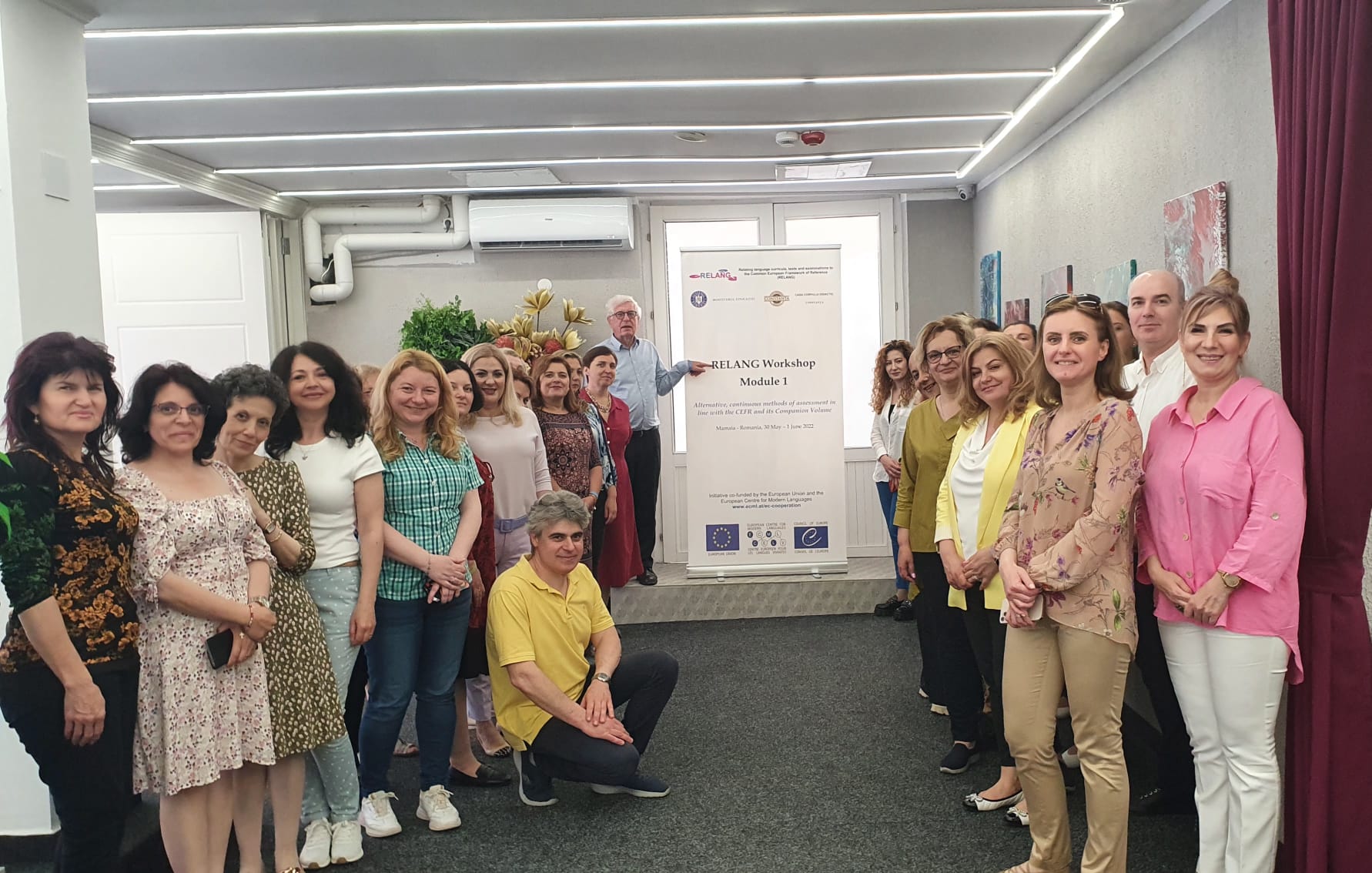
28.10.2021
Relating language curricula, tests and examinations to the Common European Framework of Reference (RELANG): ECML online national training workshop (25 October 2021, Romania)
Local organiser: Rodica Diana Cherciu, Ministry of Education and Research
ECML experts: José Noijons, the Netherlands
Participants: 24 (language testers and examiners, item writers, teachers and teacher trainers, curriculum developers, language inspectors)
“In the context of the visible reform of the Romanian educational system, the workshop entitled ‘Literature and creative texts: how to practice and test literature in line with the CEFR and the Companion Volume’ stood for an authentically new shift in the approach to the CEFR standards in relation to literature. What stirred the interest of the attendees was the way literature and especially the creative response could be used in the process of reaching the standards associated to the linguistic levels.
At the same time, the integrative manner of presenting the main topics put forth challenging connections, ranging from envisioning and valuing literature, as part of curriculum, in CEFR terms, to making up learning tasks grounded on literary texts to be further assessed and rated according to adequate scales.
The seminar proved to be a relevant exercise of curriculum design and assessment appreciated by all the participants who unanimously agreed on the workshop novelty and efficiency and recommended this course to the foreign language teachers regardless of the language taught.”
Rodica Diana Cherciu, local organiser, 3 November 2021
ECML project website: RELANG – EU-ECML cooperation agreement 2020-2021 "Innovative methodologies and assessment in language learning"
07.12.2020
Roumanie, Iasi : Les approches plurielles des langues et des cultures en classe de FLE et de DNL en français
Date : 14 et 21 novembre 2020
Format : événement en ligne
Organisation locale : Doina SPITA, vice-présidente de la Fédération internationale des professeurs de français (FIPF)
Experts du CELV :Ildikó Lőrincz (Hongrie), Jean-François de Pietro (Suisse)
23 participants : 14 enseignants de FLE de secondaire, 3 enseignants de DNL en français, 3 étudiants futurs enseignants de FLE, 3 professeurs d’université (Roumanie)
En tant que professeurs de langues au XXIème siècle, nous avons besoin de savoirs et de savoir-faire permettant la mise en place de dispositifs de travail qui aident les apprenants à prendre conscience de leur potentiel plurilingue pour ensuite le valoriser dans des situations de communication multilingue, si fréquentes aussi bien dans le monde réel que virtuel.
Or, force est de reconnaître qu’une telle méthodologie innovante, adaptée aux nouveaux défis de l’enseignement-apprentissage des langues dans le contexte du plurilinguisme occupe une place bien modeste dans les programmes de formation initiale et continue de la plupart des pays. C’est la raison pour laquelle faire participer les différents enseignants et futurs enseignants de et en français à un tel module de formation représente une priorité.
L’atelier « Les approches plurielles des langues et des cultures en classe de français langue étrangère (FLE) et de disciplines non linguistiques (DNL) en français » a parfaitement répondu à ces objectifs. A son issue, les participants ont fait preuve d’avoir compris les enjeux de la nouvelle méthodologie, d’avoir intégré les opportunités du Cadre de référence pour les approches plurielles des langues et des cultures (CARAP) et même d’être capables de concevoir des modules spécifiques autonomes et ainsi valoriser les approches plurielles et le numérique comme vecteurs de motivation de l’apprentissage.
Doina SPITA, coordinatrice locale de la formation
Actualités en roumain
Ca profesori de limbi ai secolului XXI, avem nevoie să știm să concepem dispozitive de lucru care să-i ajute pe elevi/studenți să-și descopere și conștientizeze potențialul plurilingv pentru a-l putea mai apoi valorifica în situațiile de comunicare multilingvă, atât de frecvente în lumea reală ca și în cea virtuală.
Trebuie să recunoaștem că o asemenea metodologie inovatoare, adaptată noilor provocări ale predării-învățării limbilor în contextul plurilingvismului, ocupă un loc foarte modest în programele de formare inițială și continuă din majoritatea țărilor. Acesta este motivul pentru care considerăm că a-i antrena pe profesorii sau viitorii profesori de franceză sau de DNL în franceză să participe la o asemenea formare reprezintă o prioritate.
Atelierul Les approches plurielles des langues et des cultures en classe de FLE et de DNL en français a răspuns perfect acestor deziderate. La terminarea sa, participanții au putut dovedi că au înțeles provocările noii metodologii, că au integrat oportunitățile CARAP-ului și că sunt capabili să conceapă module specifice autonome valorificând astfel beneficiile abordărilor pluraliste și ale digitalizării ca vectori de motivare a învățării.
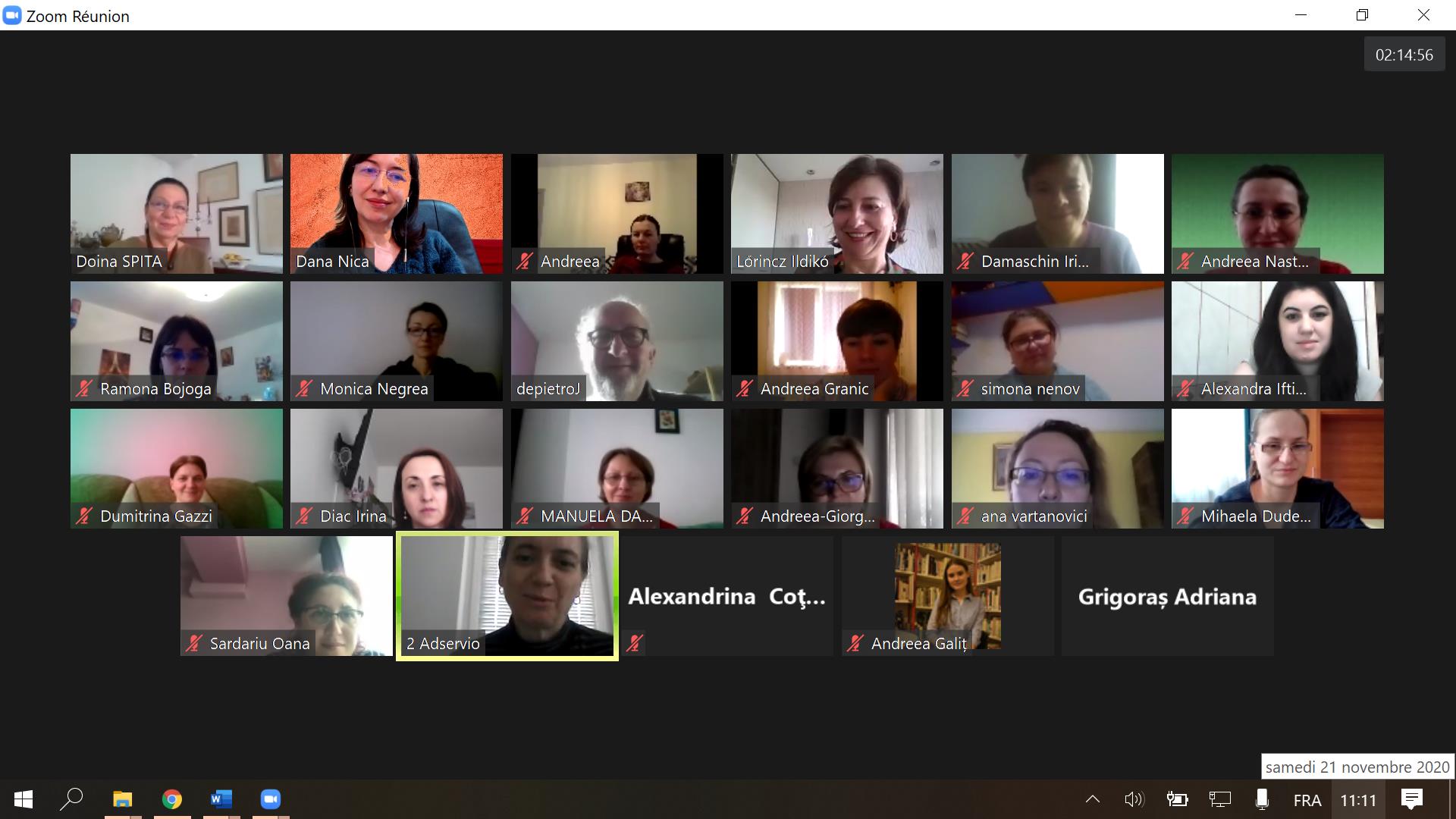
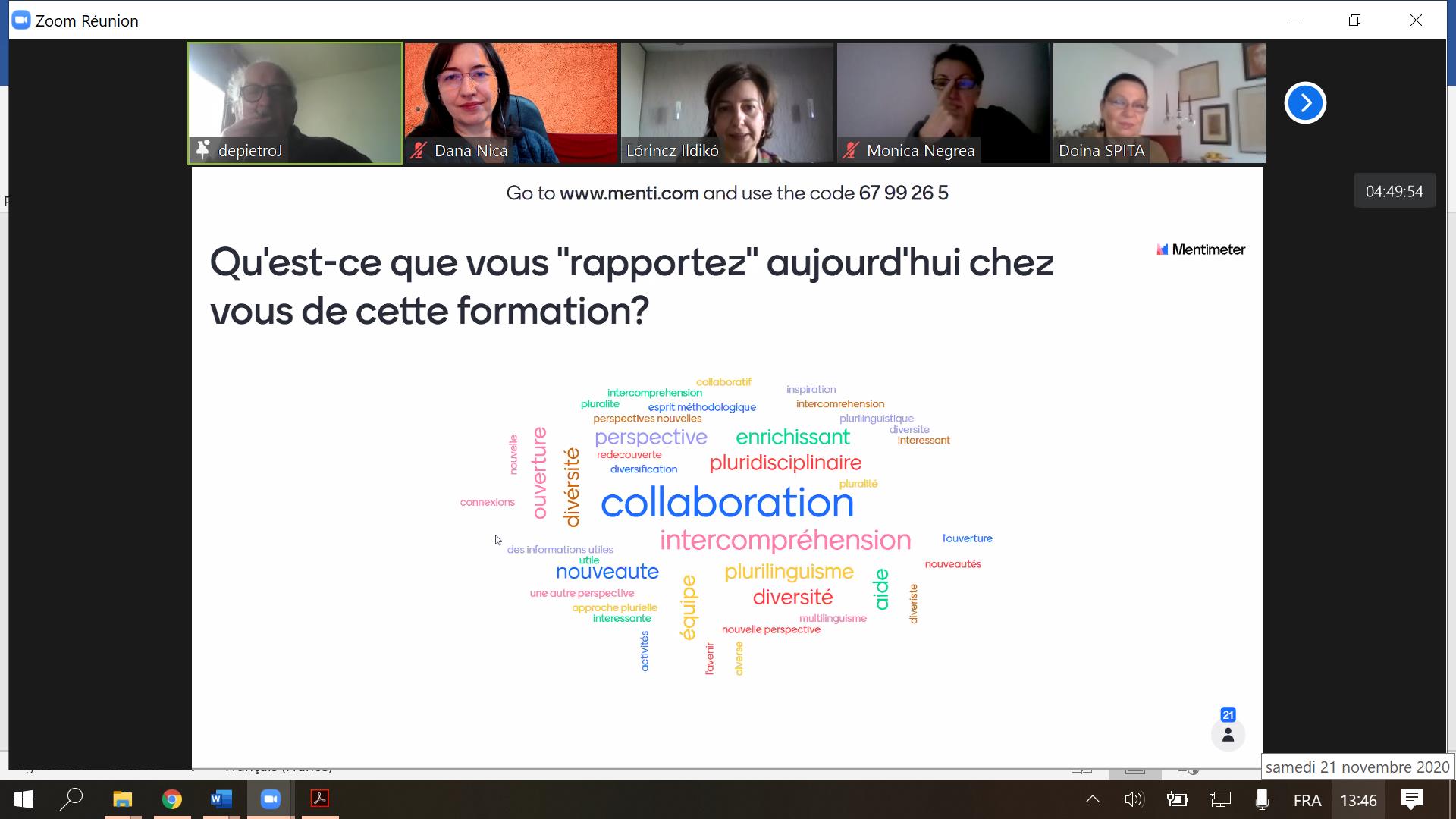
19.10.2020
Action research workshop for German teachers in Romania organised by the Centrul pentru formarea Continua in Limba Germana (CPD)
Action research workshop for German teachers in Romania organised by the Centrul pentru formarea Continua in Limba Germana (CPD)
Action research carried out by dedicated teachers leads to innovation in classrooms, enhanced teacher efficacy and helps learners to reach their potential.
Until very recently, for many European action researchers, it had always seemed that face-to-face meetings are an absolute necessity to get teachers involved in action research. However, we are currently making new experiences and discoveries.
The CPD Centre for German teachers in Sibiu/Hermannstadt is running a series of training activities on action research based on the ECML project “Action research communities for language teachers” (ARC). The framework for the activities is:
- 90-minute session on action research for German teachers organised by the Centre and held by members of ARC team
- 90-minute session on an innovative didactic approach held by an expert from Germany
- Teachers embark on small action research projects supported by a member of the ARC team at the Centre
- Theme: Moving around in the language classroom - even in times of online learning
- Online presentations of projects by participants
What we are finding out:
- The web-based tools developed by the project www.ecml.at/actionresearch are particularly suitable to be shown online!
- It is necessary to reduce timeslots, which, in turn, means precise preparation.
- Teachers from different parts of the country were surprised by the invitation to participate and grateful for the opportunity.
- It is really important that the communication platform for the events is well-organised and offers the functionality to:
- chat and record the chat;
- allow participants to speak;
- see everyone present during the session;
- show materials through screenshare moving flexibly from PowerPoint to pictures and websites;
- allow work in breakout rooms with easy transfer into breakout rooms and back again to plenary.
*****
German version
Aktionsforschungsworkshop für DeutschlehrerInnen in Rumänien, organisiert vom Centrul pentru Formarea Continua in Limba Germana (CFCLG) / Zentrum für Lehrerfortbildung in deutscher Sprache
Aktionsforschung, die von engagierten LehrerInnen durchgeführt wird, führt zu Innovationen im Klassenzimmer, erhöht die Effizienz der LehrerInnen und hilft den Lernenden, ihr Potenzial auszuschöpfen.
Bis vor kurzem schien es vielen europäischen AktionsforscherInnen, dass persönliche Treffen eine absolute Notwendigkeit sind, um LehrerInnen in die Aktionsforschung einzubeziehen. Zurzeit machen wir jedoch ganz neue Erfahrungen und Entdeckungen.
Das Fortbildungszentrum für Deutschlehrerinnen und -lehrer in Sibiu/Hermannstadt, führt auf der Grundlage des Projekts „Aktionsforschungsnetzwerke für SprachenlehrerInnen“ Fortbildungen zur Aktionsforschung durch.
Es wurde folgender Ablauf geplant:
- 90-minütige Sitzung zur Aktionsforschung für DeutschlehrerInnen, organisiert vom Zentrum und durchgeführt von Mitgliedern des ARC-Teams
- 90-minütige Sitzung über einen innovativen didaktischen Ansatz, unter der Leitung einer Expertin aus Deutschland
- LehrerInnen beginnen mit kleinen Aktionsforschungsprojekten, die von einem Mitglied des ARC-Teams im Zentrum unterstützt werden
- Thema: sich im Sprachunterricht bewegen - auch in Zeiten des Online-Lernens
- Online-Präsentationen von Projekten durch TeilnehmerInnen
Was wir gerade entdecken:
- Die vom Projekt www.ecml.at/actionresearch entwickelten Online-Tools sind für den Online-Einsatz besonders gut geeignet.
- Es ist notwendig, die Zeitfenster zu verkürzen, was wiederum eine präzise Vorbereitung bedeutet.
- Lehrerinnen und Lehrer aus verschiedenen Teilen des Landes waren von der Einladung zur Teilnahme überrascht und dankbar für die Gelegenheit.
- Es ist wichtig,
- dass die Plattform gut organisiert ist und Funktionen auf dem neuesten Stand der Technik bietet;
- dass es eine Chatmöglichkeit gibt und dass der Chat aufgezeichnet werden kann;
- dass man den TeilnehmerInnen das Wort erteilen kann;
- dass man alle während des Treffens sehen kann;
- dass man Materialien durch Teilen des Bildschirmes zeigen kann;
- dass man flexibel von PowerPoint zu Bildern und Webseiten wechseln kann;
- dass Gespräche in den Breakout-Räumen möglich sind, mit reibungslosem Hin- und Herschalten zwischen den Breakout-Räume und dem Plenum.
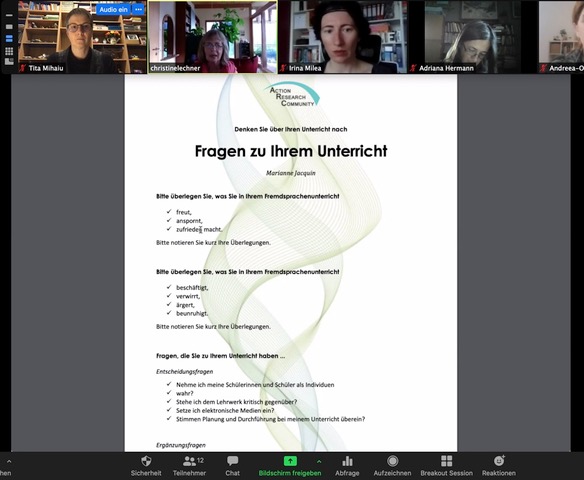


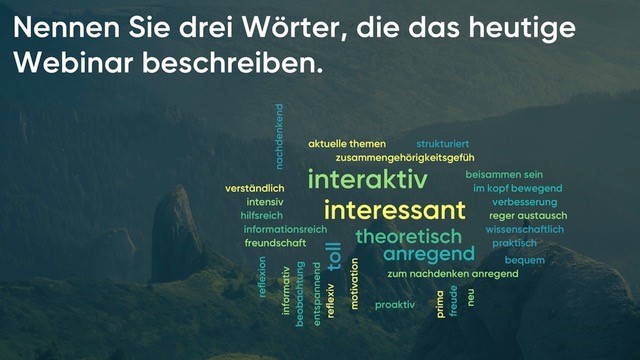
30.04.2018
Atelier régional «Vers un Cadre européen commun de référence pour les enseignants de langues» (Bucarest, Roumanie, 22-23 mars 2018)
En mars 2018, l’Université d’études économiques de Bucarest (www.ase.ro) a accueilli un atelier régional du projet. Professeur Laura-Mihaela Muresan, membre du réseau du projet depuis 2016, a invité plus de 40 formateurs d’enseignants, enseignants, responsables éducatifs et étudiants à cette manifestation de deux jours. Les experts, venus de Roumanie, de Bulgarie, de la République de Moldova et de Pologne, étaient spécialisés dans des domaines allant de l’enseignement des langues à des fins spécifiques (par exemple anglais et français des affaires) à l’enseignement du roumain comme langue étrangère.
Pour l’équipe de projet, cet atelier a permis d’obtenir des informations sur les priorités actuelles et sur les défis auxquels sont confrontés les éducateurs en langues en Europe centrale et orientale, ainsi que de recueillir des réactions et des avis pertinents sur le travail en cours sur le projet.
Les experts réunis ont examiné le projet de Guide en ligne pour les instruments décrivant les compétences des enseignants, qui est accessible ici. Ils ont également fourni des commentaires précieux sur le premier projet d’inventaire des compétences des enseignants. Les échanges ont abouti à de nombreuses idées pertinentes et à des suggestions concrètes pour rendre le site web et les autres produits du projet attractifs et stimulants, mais également innovants dans le contenu, ambitieux dans les objectifs et efficaces dans l’ambition de fournir le maximum d’aide à différents types d’enseignants et d’apprenants.
- Site web du projet «Vers un Cadre européen commun de référence pour les enseignants de langues» (2016-2019) : français - anglais
L'équipe du projet du CELV : Lukas Bleichenbacher (coordinateur du projet),
Francis Goullier, Anna Schröder-Sura, Richard Rossner
29.11.2016
Workshop for teachers of German teachers - “Teaching about the culture of a target-country language in the language classroom: Austria” (Hermannstadt/Sibiu, Romania, 20-22 October 2016)
Members of the Action Research Communities for language teachers ran a workshop for teachers of German in Hermannstadt/Sibiu from 20th to 22nd of October, 2016. The aim was to introduce teachers to an action research way of thinking, to understand the benefits of action research for the enhancement of their classroom practice.
The content theme of the seminar was “Teaching about the culture of a target-country language in the language classroom: Austria”. The workshop opened with activities to exchange and compare knowledge, beliefs and opinions about Austria. The next stage was an analytic discourse based on posters made by the teachers to visualise a typical lesson on a cultural aspect in their German class.
The first day was concluded by general information about the “Action Research Communities for language teachers” and also by showing what the European Centre for Modern Languages (ECML) can offer to teachers of languages. It was important to ask for the participant feedback on what they had found interesting on the first day and what their hopes were for the continuation. Clearly, the teachers were keen to get concrete input that they could use at school. We were very pleased that they had found the exchange and getting to know each other professionally at some depth through the analytic discourse useful.
The second day opened with input on action research followed by an opportunity for the teachers to look at materials on Austria and approaches that they might use. They worked in groups moving from station to station. At the end of the second day, the teachers started to think about themes that they might work on and appropriate groups.
The third day opened with input on Learning Study as a co-operative form of action research and on an activity to generate shared visions for lessons on aspects of culture. The participating teachers planned in groups to hold lessons in their own classrooms and to write a joint report following individual experiences. The plans were shared through short presentations showing intentions and expectations.
We ended the workshop with a “crumple-paper” evaluation: “Lots of fun - using the methods presented will be worthwhile – we will carry on working together”.
03.06.2016
Conférence internationale sur la didactique du FLE « Partager pour s’enrichir »: les apports du CARAP (16 avril 2016, Iasi, Roumanie)
Le 16 avril 2016 s’est déroulée dans la ville de Iași la huitième session de la conférence internationale sur la didactique du FLE, « Partager pour s’enrichir », organisée par l’Inspection académique de Iasi et l’Association roumaine des professeurs de français avec le soutien de la Délégation Wallonie-Bruxelles et de l’Ambassade de France en Roumanie.
Au programme: des conférences, des interventions de cadrage et des ateliers de réflexion didactique. Une place particulière était réservée à l’application CARAP qui a revêtu deux formes également intéressantes : une intervention en session plénière, dont les 195 participants ont pu bénéficier, et un atelier ciblé sur la construction des projets interlinguistiques et interdisciplinaires (24 participants motivés).
L’agencement des thèmes proposés par les deux experts du CELV – Comment créer des passerelles entre les langues de son répertoire en milieu scolaire et Construire un projet plurilingue en valorisant la synergie des apprentissages langagiers – fait ressortir la pertinence et la richesse du projet CARAP au moment où la question de la diversité est au cœur des politiques éducatives européennes.
Notons qu’il s’agit du troisième événement de formation et conseil axé sur projet CARAP qui répond au besoin de professionnalisation des compétences didactiques des enseignants de langues romanes en Roumanie : aux mois d’avril et de juin 2015, à Iasi, ont été mises à l’honneur la base de ressources didactiques CARAP et la méthodologie intercompréhensive.
En 2016, en tirant parti des apports du CARAP pour la description de la compétence plurilingue et interculturelle, l’accent a été mis sur les avantages cognitifs des approches plurielles et, en particulier, sur les bénéfices de la didactique intégrée des langues vivantes. Cela a eu le mérite d’alimenter des échanges enrichissants sur la nécessité d’un curriculum intégré des langues vivantes et notamment sur le repositionnement de l’enseignement du français dans le contexte d’une éducation plurilingue.
Auteur: Dan Ion Nasta, Institut des sciences de l’éducation, Bucarest
Ressources connexes: